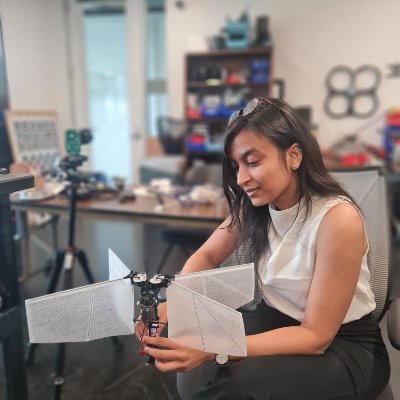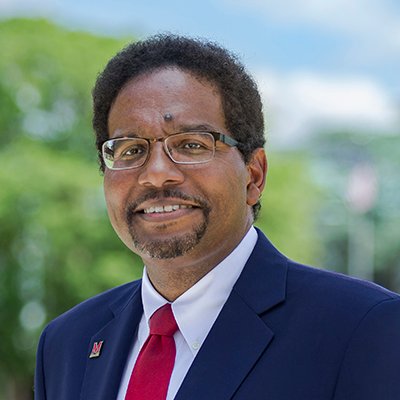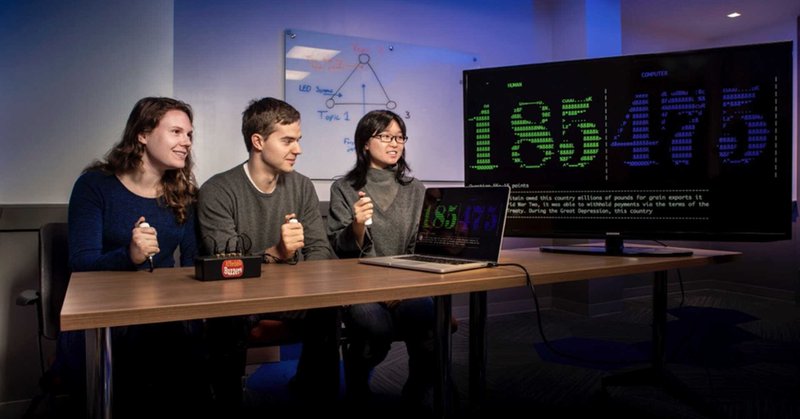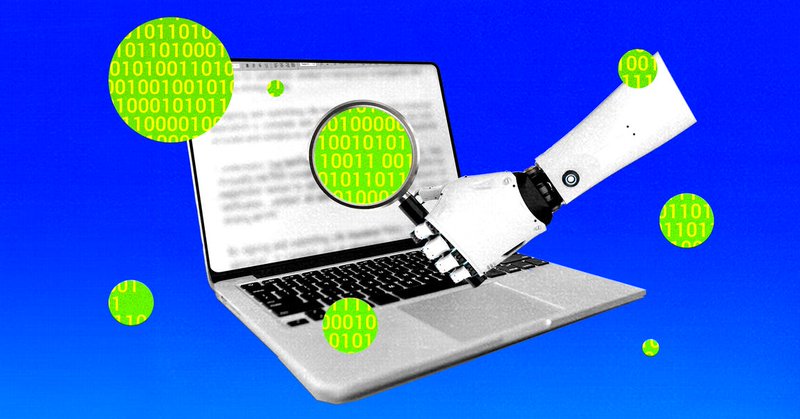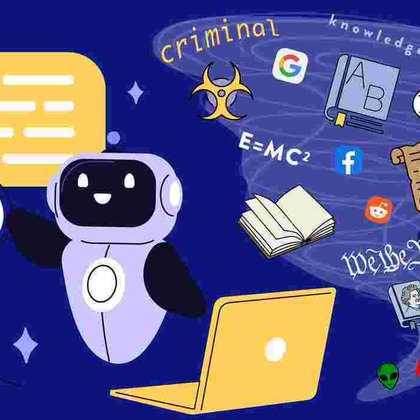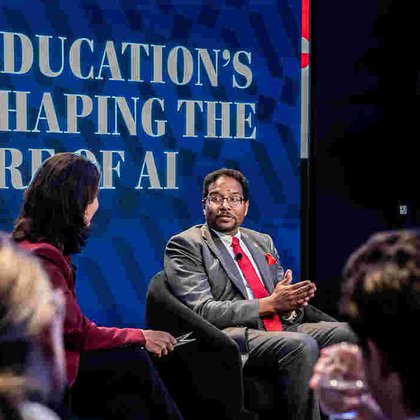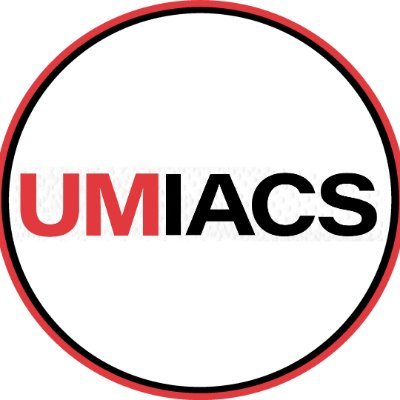
UMIACS
@umiacs
Followers
2K
Following
4K
Media
733
Statuses
5K
Official account of the University of Maryland Institute for Advanced Computer Studies.
College Park, MD
Joined July 2010
A team of @UofMaryland researchers led by Jordan Boyd-Graber (@boydgraber) is using a revamped #quizbowlformat to explore how #AI and humans can best work together. Their goal? Improve the evaluation of AI-infused question and answering systems by comparing how models and human
0
2
4
Kaiqing Zhang recently received funding from Open Philanthropy (@open_phil) to study how large language models interact, including hidden communication and collusion, aiming to advance safe and reliable multi-AI systems. Read more: https://t.co/G5hH4nuw4G
0
0
0
E-waste is a global crisis: less than a quarter of the 62 million tons produced annually are successfully recycled. Researchers @UofMaryland, @NotreDame & @GeorgiaTech have proposed a viable solution to this problem by developing a fully recyclable printed circuit board that
0
0
1
Software developers put guardrails in AI systems to prevent offensive or inappropriate outputs, but these often leave little room for nuance in real-world applications. @UofMaryland researchers Tom Goldstein (@tomgoldsteincs) and Monte Hoover (@MonteBHoover) teamed up with
0
2
2
Honored to share my thoughts on Insect-Inspired AI. Stay tuned for our upcoming research. #Robotics #AI #Bioinspired
@umiacs @prgumd
Students at the University of Maryland trained a tiny drone to fly safely through tight spaces by mimicking the visual processing and flight behavior of honeybees. They used artificial intelligence, or AI, to train the flight and image processing algor...
0
2
8
A clever initiative from researchers in @UMDscience and @UMIACS, where humans team up with AI technology in quizbowl competitions to improve collaboration between humans and AI. #AIMaryland
today.umd.edu
UMD Researchers Revamp Quizbowl Competition to Gauge Trust and Collaboration Between People and Machines
1
6
9
Bahar Asgari (pictured right) and her students in the Computer Architecture & Systems Lab are leading the charge on advancing sparsity—a key optimization for faster, more efficient computing. They're presenting four papers, and Asgari is co-leading a workshop on the topic at
0
0
0
The @UofMaryland's AI media day featured @umiacs-supported research from the Perception & Robotics Group and the Small Artifacts Lab: Levi Burner (@levisburner) demoed a drone that uses AI to stabilize its image capturing system. Learn more: https://t.co/BD38eG1FP7 Jiasheng Li
0
2
1
The @UofMaryland is hosting a media event to showcase a broad range of #AI activities on campus. Several faculty and students @umiacs participated, including Hal Daumé III (@haldaume3) and Naitri Rajyaguru (@naitri_r) from the Perception and Robotics Group.
0
5
18
In this week’s edition of #TrustTRAILS, Susan Ariel Aaronson (@AaronsonSusan) explains the important relationship between data and AI, and the need for more accurate, complete and representative datasets that are used in AI-infused systems. Aaronson is a research professor
0
3
3
What does it take to advance AI literacy? Our experts—Virginia Byrne (@VirginiaLByrne) from @MorganStateU, David Broniatowski (@Broniatowski) from @gwuengineering, Hal Daumé III (@haldaume3) from @UofMaryland, and Brandeis Marshall (@csdoctorsister) of @DataedX_—explain how
6
8
8
Soheil Feizi (@FeiziSoheil) told @BusinessInsider that he recommends avoiding the use of AI detectors for 3 main reasons: 1) the results are rarely accurate, and false positives are common 2) he encourages professors, teachers, and editors to accept the use of AI in writing 3)
businessinsider.com
After running 500 documents through various AI detectors and talking with experts, we recommend just two. We suggest using these tools with caution.
0
0
1
Physics Ph.D. student Raunak Dey (@raunak_dey_) uses mathematical models to study how viruses affect microbial communities and human health. He is a student fellow at the Center of Excellence in Microbiome Sciences, which is supported @umiacs. Read more: https://t.co/Va116aT7K8
0
0
2
“If you look at who is building AI technology in the world today, it tends to be a very narrow slice of the world’s population," says Hal Daumé III (@haldaume3), a professor of computer science @UofMaryland and director of @trails_ai. In this edition of #TrustTRAILS, Daumé
0
3
5
In a paper just published in Computational Linguistics, @ClipUmd's Philip Resnik (@psresnik) argues that "baked-in" bias in current #AI-infused large language models calls for deeper solutions. https://t.co/mSLFezC0dx
today.umd.edu
New Paper Argues Baked-in Bias in Current Models Calls for Deeper Solutions
0
3
5
“The crowd chuckled when Daumé recalled how 2 early LLMs developed by Terps were named Bert & Elmo in a nod to famed UMD alum & Muppets creator Jim Henson.” Thanks @haldaume3 for mentioning work by @ClipUmd alums Jacob Devlin & Mohit Iyyer (@MohitIyyer)! https://t.co/PXrkl1UJJD
today.umd.edu
Pines, Daumé Join International Leaders, Tech Pioneers to Discuss AI’s Impact on Education and More
0
1
5
Najib El-Sayed is the next speaker at Science on Tap, a monthly lecture series hosted by @UMDscience at @LedoPizza in College Park. He will discuss how his lab is leveraging RNA technologies & machine learning to study host-pathogen interactions. Register: https://t.co/SOXFi78tZ6
0
2
3
How can we best promote trust in AI? And how can we make sure that people are aware of the risks so that they can make informed decisions? In this week’s edition of #TrustTRAILS, faculty experts David Broniatowski (@Broniatowski), Susan Aaronson (@AaronsonSusan), Hal Daumé III
0
1
2
How do people make sense of what AI is doing, and how does that impact their trust of AI? In this week’s edition of #TrustTRAILS, David Broniatowski (@Broniatowski), Hal Daumé III (@haldaume3) and Brandeis Marshall (@csdoctorsister) explain how TRAILS is focused on developing,
0
1
4

